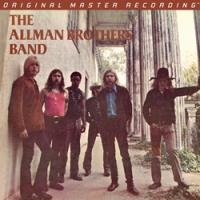"The Allman Brothers Band" Debut Half-Speed Mastered By Mobile Fidelity
While The Allmans have since become a jam band institution and achieved great commercial success over the years (their annual week-long stint at New York's Beacon Theater is a quick sell-out), this album did not become an instant big seller, though it was critically well-received.
Only three years after its release, ATCO reissued it as a "twofer" with Idlewild South the band's follow-up album.
The double drummer debut featuring the late Duane Allman holds up very well forty four years later, thanks to the expert musicianship and the timeless blues genre. While blues no longer attracts much of a black audience, white folks still dig it and this amalgam of white boy Southern blues and rock keeps on rockin' in the 21st century. Gregg Allman's vocals remain monumental
The drumming duo of Butch Trucks and Jai Johanny Johanson jet propels the proceedings and provides a fine anchor for Duane Allman's high pitched slide fretwork and Dicky Betts' deeper string thrusts. It could be just "the times" but there are echoes of The Grateful Dead and Santana lurking here, though Santana's debut was also issued in 1969.
The original "Whipping Post" is but one highlight in an album that contains no "lowlights", assuming of course that you dig Southern blues-based rock.
So how did Mobile Fidelity do with its remastering? I compared it to an original ATCO pressing and the version in the 1972 "two-fer". First of all, this is not a sonic spectacular to begin with, though Adrian Barber's (he was involved with The Beatles way early on, later with Cream and then with Aerosmith) engineering and particularly his mix are more than competent, with a fine spread across the stage, highlighted by the dual drummers hard-left and hard-right and a smooth blend in between that nicely congeals the whole thing in a modestly wet reverb.
The original (at least my copy) can't compare to the "two-fer." The original sounds hazy and indistinct (as did many ATCOs of that era) and the bass is rolled off and cardboardy, particularly the kick drums that have neither impact nor extension. You can barely make out Berry Oakley's bass. The two-fer is moderately better but Mobile Fidelity's reissue is a huge improvement in terms of overall instrumental clarity, dynamics and especially bass extension and clarity. The old Mo-Fi issue of rolled highs and anemic dynamics have been 100% eliminated.
If you're a fan of this album and have heard it a thousand times, I promise you, you've never heard it like this. What's more, the clarity reveals musical details heretofore hidden in the original's murk. "Whipping Post" in particular will startle you if you've grown up with the original.
Reissues sometimes better originals, sometimes it's a toss-up, sometimes originals kill the reissues and sometimes it's open for debate. In this case it's no contest: this Mobile Fidelity beats the original in every way.
That said, there's still no excuse for the inner gatefold photo of the naked Allman Brothers Band. It's a world class weenie shriveler— even if you're gay.




